We all know that AI is the future, whether it comes to the social media industry, fantasy, or music streaming.
However, there are still ifs and buts that need to be answered when it comes to music streaming apps.
Music streaming is a continuously growing industry, and if you want to excel in it, adopt new technologies such as AI.
Now, the question is “ How to create an AI for a music streaming app?”
Well, here we have connected all the dots and have tried to answer all your points.
Are you ready to cover it with us?
Let’s proceed.
What is AI in Music Streaming Apps: Market Size & Their Related Stats
Before we begin to learn about the future of AI in music streaming apps, it’s essential to focus on what the feature is and how it assists in the current fast-paced world.
Artificial intelligence, or AI, can be described as a field of Science that is concerned with building computers and machines that act in a way that normally requires human intelligence and includes data whose scale exceeds what humans can analyze.
Additionally, it enables computers and machines to stimulate human learning, problem-solving, comprehension, creativity, decision-making, and autonomy.
When you use AI in music streaming apps, it simply helps the platforms analyze a huge amount of user data for predicting the behavior of the users, personalizing content, targeting the audience, segmentation, and even forecasting trends.
Along with this, AI assists in generating algorithms and new music by analyzing large amounts of musical data, along with learning the patterns of its total composition.
In the current era, AI is being used to produce music.
Additionally, once the tech has enough information, it can be effective for learning the unique properties of music and for producing something new that is completely based on the data it received.
In the year 2023, the consumers expressed their opinions on the benefits of AI for streaming platforms, with improved content recommendations as well as personalized playlists ranking highest with 37% of respondents, followed by AI-generated subtitles as well as translations for enhancing the overall experience of the users.
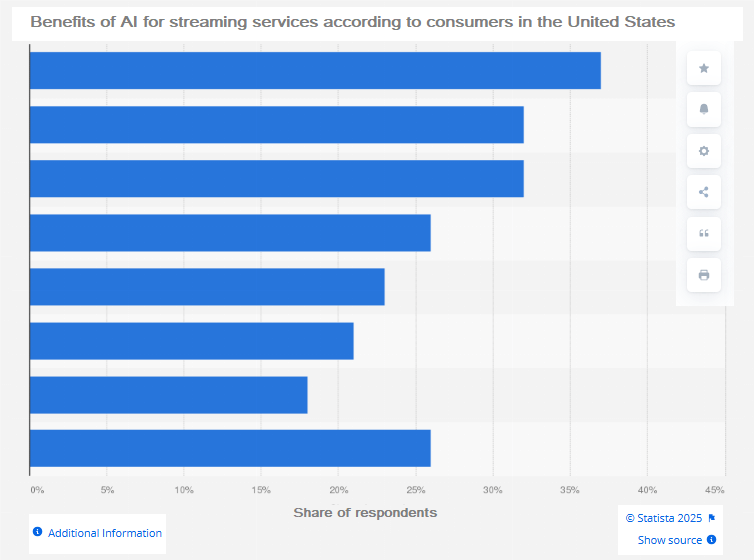
AI-generated music is expected to boost the music industry’s revenue by 17.2% in the year 2025. Additionally, 74% of internet users have used AI to discover or share music.
However, 82% of music listeners can’t tell the difference and are confused between music made by humans and AI.
Along with this, 60% of the musicians are currently using AI tools for their music. 20.3% of musicians use AI in their music production process.
The global AI in music market size is expected to be worth around USD 38.7 billion by the year 2033 from USD 3.9 billion in the year 2023, growing at a CAGR of 25.8% from the year 2024 to 2033.
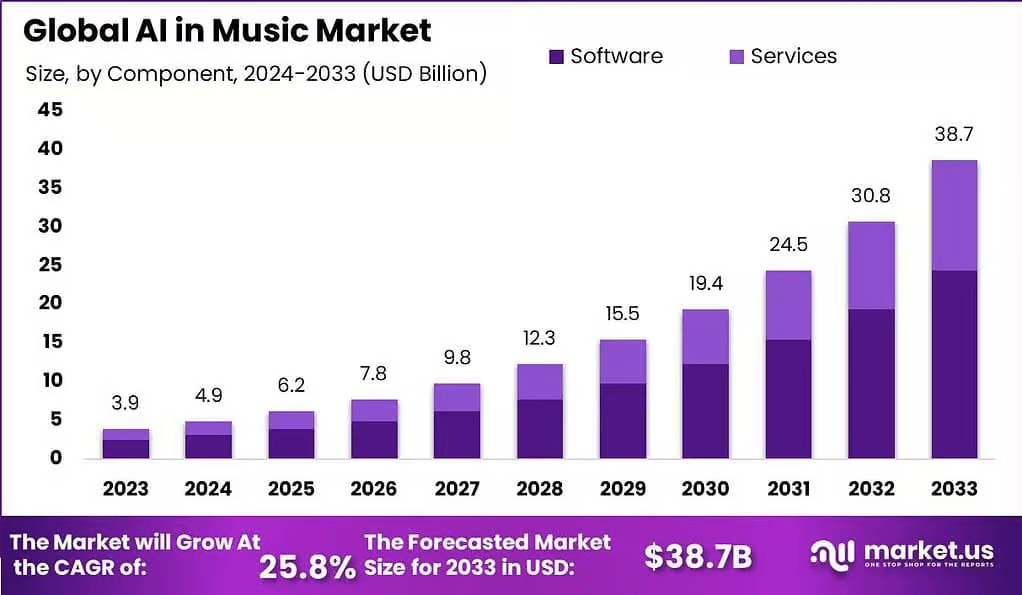
Additionally, AI-generated music is anticipated to contribute to a 17.2% increase in revenue in the music industry by 2025.
Generation Z is much more open to AI being used in the production of music. Nearly half of the Gen Z respondents stated they would be interested in listening to music produced by AI. Additionally, the older generations seem more hesitant towards the topic, with only 36%.
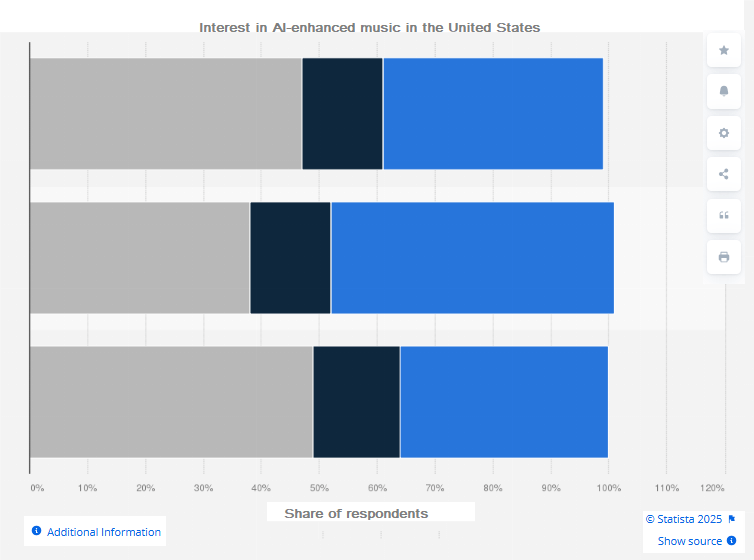
The global intelligent virtual assistant market revenue has reached USD 15.3 billion in 2023 to reach USD 309.9 billion by 2033.
In the global world, the generated AI in music market size is estimated at USD 440.0 million in 2023 and is further projected to grow at a CAGR of 30.4% from 2024 to 2030.
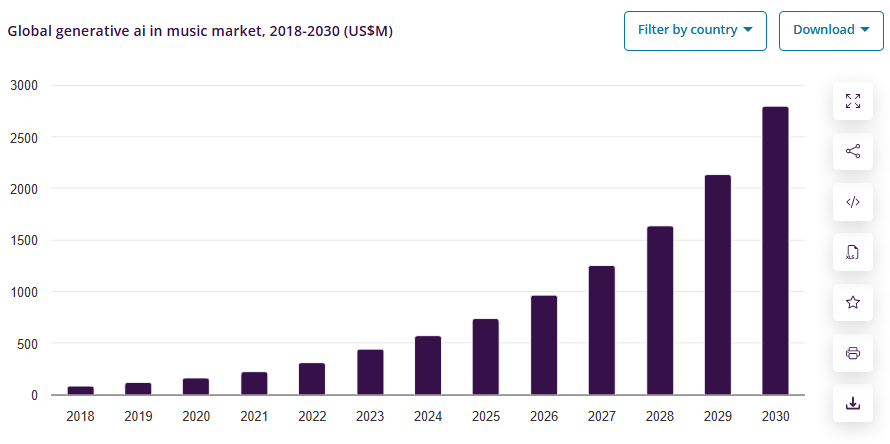
Now, let’s discover how to develop an AI music streaming app in the following section.
Benefits of AI in Music Streaming Apps
What are the advantages of using AI in music streaming apps?
Here’s a defined list to follow.
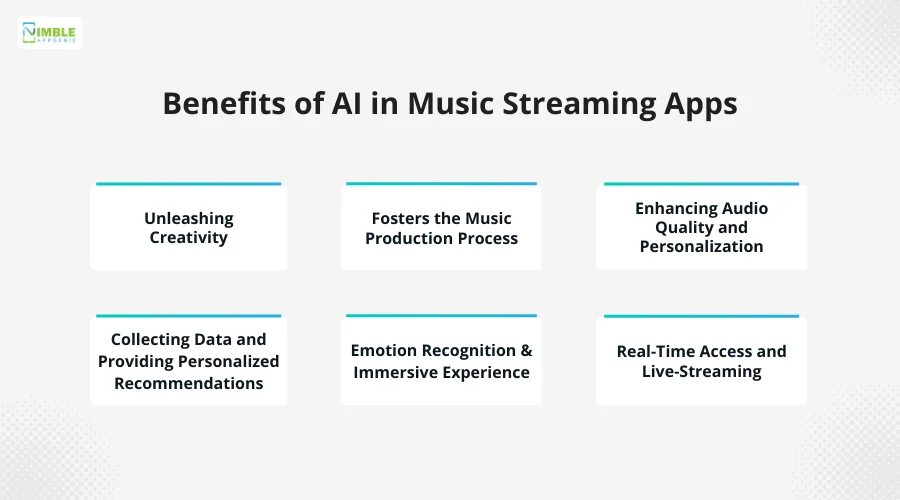
♦ Unleashing Creativity
One of the benefits of using AI in music streaming is the freedom for the creators. Additionally, users can consider AI music tools to be a powerful collaborator for generating creative ideas.
Using AI for music streaming apps can help improve the overall performance of an app through creativity.
♦ Fosters the Music Production Process
With the implementation of AI in music streaming apps, these algorithms can also analyze a track’s audio and might make real-time suggestions for improvements.
These tools can help generate new pieces of a track by evaluating the diversified music patterns, styles, and structures.
♦ Enhancing Audio Quality and Personalization
AI is playing an important role in improving the total audio quality of the music streaming app.
AI-based technologies, including machine learning models for audio enhancement, can optimize the complete sound quality by adjusting the equalization and its overall volume levels.
♦ Collecting Data and Providing Personalized Recommendations
With the implementation of AI, you can collect wide data and use it for the user’s benefit. Here, with the help of this data, you can provide personalized recommendations.
Through AI-driven music, promotion can save the user’s time and resources, so the users can focus more on the creative work.
♦ Emotion Recognition and Immersive Experience
The adoption of AI helps the creators in emotion recognition. This further assists the users in providing an immersive experience.
Here, the AI algorithm is designed to provide personalized music that is based on emotions, and AI systems need to become even more immersive.
The AI is designed to create interactive storylines that will help you connect with the target users.
♦ Real-Time Access and Live-Streaming
Streaming music offers real-time access to an ever-expanding song library, playlists, and albums. These streaming platforms regularly require updates to their catalogs, along with new releases as well as exclusive content regularly.
By evaluating the user’s preferences and search history, along with past interactions, the AI algorithms provide recommendations for relevant live streams based on specific interests.
These are some of the common benefits that should be considered while developing an AI-based music streaming app.
After covering the benefits of using AI in music streaming apps, let’s move ahead with the future trends of using AI.
Challenges of AI in Music Streaming Apps and Their Solutions
What are the different kinds of challenges that your music streaming app might face while implementing AI?
Well, when you proceed to use or adopt AI in music streaming apps, there can be certain challenges that you should be bothered of.
Learn them all below.
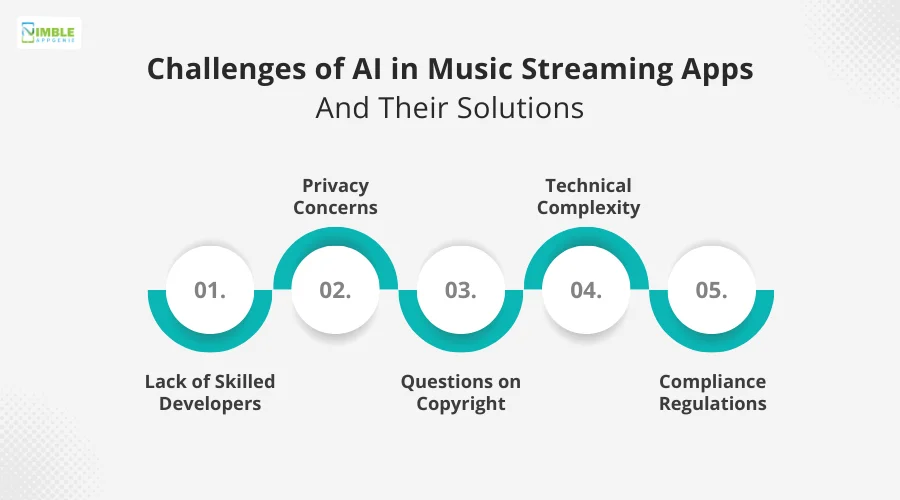
• Lack of Skilled Developers
You need to select developers who are efficient in implementing AI in your dream music streaming app. Well, if not, then it cannot be called a successful use of AI in music streaming apps.
With inefficient skills, the developers cannot create your app as per your expectations, which might impact the overall app development and even lead to complicated results.
• Privacy Concerns
One of the major errors or challenges that you might face is privacy concerns. If you implement AI in music streaming apps, your app might face challenges in keeping users’ data safe and secure to provide them maximum satisfaction when they listen to music.
When you implement a new technology such as AI, your app might face a challenge related to liability, intellectual rights, and many other privacy concerns.
• Questions on Copyright
Implementing AI in the music streaming industry raises issues related to copyright and ownership of the songs. There could be plenty of artists who might generate music via AI, which will create an issue over the copyright of the music, and is a challenge for the artist.
Thus, here, implementing a procedure to recognize the real voice and AI-generated music is an important process to consider.
• Technical Complexity
Another core error that your music streaming app might face is technical complexity. If you want to add AI to the project, this might require a certain level of technical expertise and resources.
Thus, availing this type of expertise and resources for your AI music streaming app can be a barrier for smaller teams or less tech-savvy developers.
• Compliance Regulations
One of the factors that your music streaming apps might face due to AI is compliance with regulations. It’s all about considering the AI in music streaming apps, only after identifying that it will not impact the integrity of music.
When it comes to music streaming apps, you need to buy licenses based on the regions that will be helpful to address the issues of the users. Thus, the following compliance practices are very important in this scenario.
These are some of the crucial mistakes to avoid while creating a music streaming app that need to be considered before adopting AI in music streaming apps.
Now, let’s look forward to the prominent technologies used in music streaming apps. AI is a broad concept when it comes to implementing it in music streaming apps.
We’ll consider them all in the following section.
Key AI Technologies Used in Music Streaming Apps
Let’s discover the role of AI technologies in music streaming apps, which will help you guide with different types of current AI technologies that you should use in your apps.
Here’s a list of AI technologies to consider.
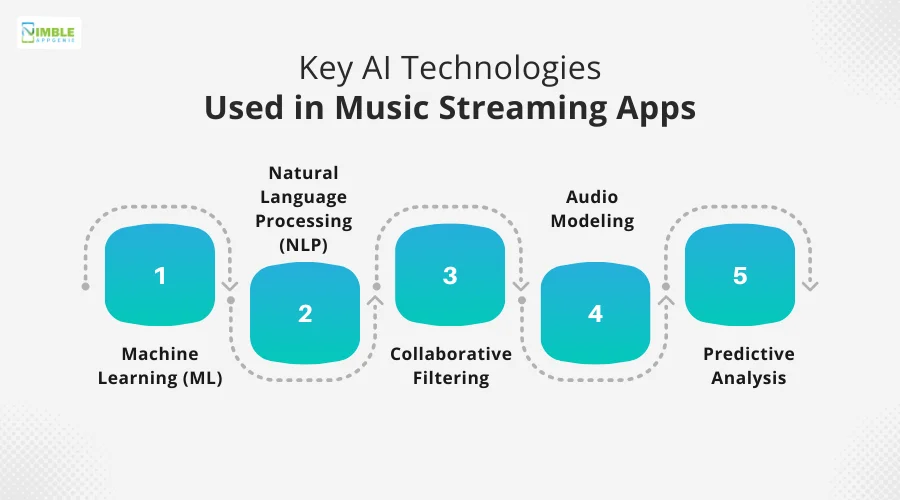
► Machine Learning (ML)
As users interact with the platform, ML algorithms regularly learn and adapt to evolving preferences.
This changing process allows streaming services to be ahead of changing tastes.
It does help the users to know about new artists and genres that they might not have discovered on their own.
► Natural Language Processing (NLP)
The use of NLP in music streaming apps analyzes the lyrics and other textual data to understand the context of songs.
This technology is mainly used to interpret human language. It is a subfield of AI and computer science that is used to help computers understand human language and communicate with it easily.
► Collaborative Filtering
The collaborative filtering method is used in music streaming apps by comparing the user’s listening history with that of other users.
The basic nature of this technology in music streaming apps is to create a user vector for every user and a song vector for every song.
► Audio Modeling
This AI technology helps in analyzing the song’s actual audio features. With audio modeling, NLP works together to analyze the lyrics and other textual data for understanding the context of songs.
Here, the compressed music files are delivered in real time to a computer or smartphone and are played directly.
► Predictive Analysis
Predictive analysis is an AI algorithm that analyzes user data, including listening habits, likes, skips, and search queries, to help predict and recommend new music to users.
The implementation of predictive analysis is helpful for the apps to identify the user’s opinions about the songs and then provide their suggestions as on their listening behavior.
These are some of the effective AI-powered music streaming technologies that can be used for the apps.
Now, when you enter a competitive industry like a music streaming app, it’s significant to look for popular AI-powered music streaming apps that can act as the best example to consider.
Conclusion
AI is the future of music streaming apps; if you bother to implement it, a complete guide can help. Under this scenario, you should start by conducting a market analysis, connecting with the developers, finalizing the key AI features to include in your app, designing it, including the essential technologies to upgrade the app, performing testing, and the launch.
In this process, you can face challenges such as a lack of skilled developers, privacy concerns, questions of copyright, privacy concerns, technical complexity, and others.
Nimble AppGenie is the leading Music streaming App Development Company focused on delivering quality, honesty, and promise to convert your dream app into reality.
The cost to develop an AI-powered music streaming app can vary depending on factors such as the developers’ skills and location, and design cost.
To earn money from AI-powered music streaming apps, you can proceed with uploading the tracks to popular streaming platforms, licensing, royalties, etc.
FAQs

Niketan Sharma is the CTO of Nimble AppGenie, a prominent website and mobile app development company in the USA that is delivering excellence with a commitment to boosting business growth & maximizing customer satisfaction. He is a highly motivated individual who helps SMEs and startups grow in this dynamic market with the latest technology and innovation.
Table of Contents




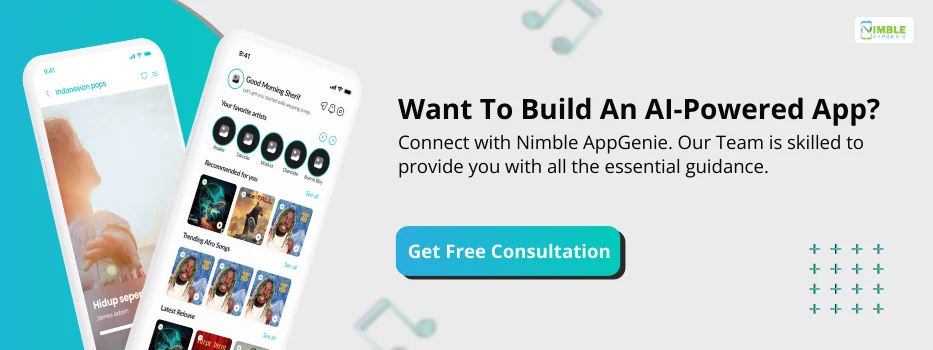
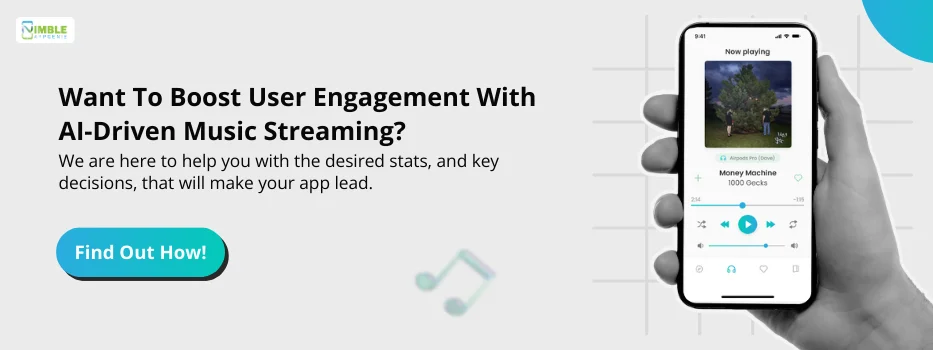
No Comments
Comments are closed.